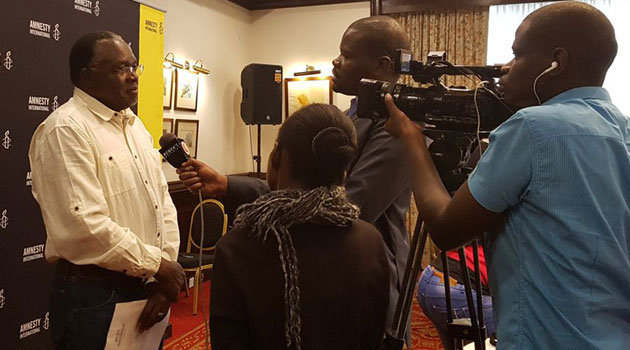
Amnesty International’s Country Director Justus Nyangaya speaking to the media at Friday’s event /COURTESY
NAIROBI, Kenya, Jun 23 – There is need for collective efforts between security agencies and civil society organisations to end cases of human rights violations in the country.
Amnesty International’s Country Director Justus Nyangaya told Capital FM News during a forum bringing together civil society organisations and the media on Friday that police brutality remains a challenge that continues to face the country and that an all-inclusive approach was needed to address the problem.
“When we talk about 65 people being killed by the police so far this year or 122 being killed last year, these are not accidents but realities that are happening. What we are saying is that this is a problem but we cannot say that the whole police service is doing it. No, not at all,” he remarked.
He underscored the importance of the police to work together with the civil society under the framework of the Police Reforms Working Group in resolving the human rights violations.
“We have worked very well with the police in terms of agreeing on areas of intervention we need to address. It is good that government bodies that are focused on this as the specific duty bearers are listening to us,” Nyangaya said.
The meeting came at a time when members of the civil society were preparing to commemorate the murder of human rights lawyer Willy Kimani alongside his client Josphat Mwendwa and taxi driver Joseph Muiruri in Athi River between June 23 and 24 last year, a murder plot executed by members of a local Administrative Police post.
Kenya Human Rights Commission’s Programme Manager Andrew Songa who also spoke to Capital FM News called for a broad-based approach to police vetting that will not only focus on corruption but also cases of human rights abuses.
He said the inclusion of human rights issues in police vetting would help address rights abuses perpetrated by the police as opposed to overly focusing on corps implicated in graft.
“The ambition for vetting was supposed to be broad-based in that we were supposed to aspire to have a standard of policing that reflects human rights principles and values, as well as accountability,” Songa said.
“Unfortunately when the roll-out started, the preoccupation became about the corruption aspect within the police and that I feel it is because of how easy it was to identify bribery,” he added.
The human rights activist said civil society organisations within the working group were committed to pointing out the gaps within security agencies as far as protection of civil rights is concerned in order to achieve better policing.
That, he said, would require closer cooperation but also transparency in the police vetting process.
“It was very clear that the public wanted the undue use of force by the police – the very brutal way crowd control has been done in the past – were things they wanted addressed,” Songa noted.
The Police Reforms Working Group comprises over 20 grassroots, national and international CSOs including Amnesty International Kenya, Kenya Human Rights Commission, Kenya National Human Rights Commission, International Justice Mission, International Commission of Jurists and Independent Medico-Legal Unit.
Others are the National Coalition of Human Rights Defenders, Kituo cha Sheria, Usalama Reforms, and the Federation of Women Lawyers in Kenya.











































